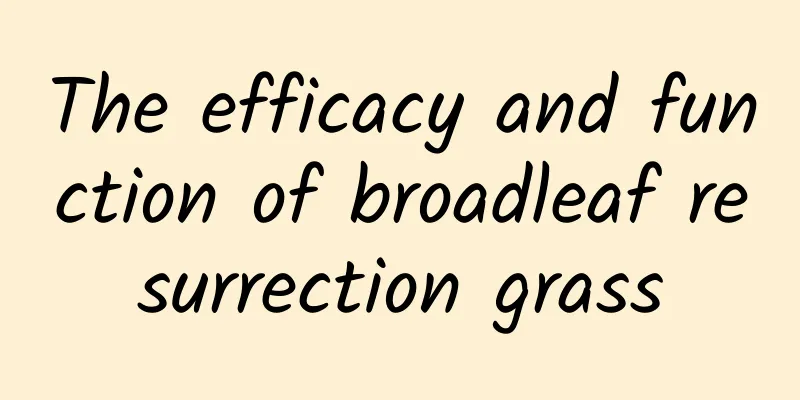The efficacy and function of broadleaf resurrection grass

|
Broadleaf resurrection grass is a traditional Chinese medicinal material. There are precedents of using broadleaf resurrection grass to treat diseases in ancient times, so we can eat it with confidence. Next, I will mainly introduce to you the effects of broad-leaved resurrection grass. [Source] Medicinal material source: the whole herb with roots of Senecio cannabinus, a plant of the Asteraceae family. [Original form] Senecio tenuifolia is a perennial herb, 60-150cm tall. There are oblique rhizomes. The stem is erect, up to 10 mm in diameter, glabrous, and often branched in the upper part. The lower leaves wither during the medicinal period; the leaves are larger, with short petioles, 2 small ears at the base, deeply pinnate or nearly palmately lobed, 10-20cm long, 8-15cm wide, lobes lanceolate or linear-lanceolate, acuminate, leaf margin densely serrated, lateral lobes 2 or 1 pair, rarely 3 pairs, shorter, glabrous on both sides or without fine hairs along the veins; the upper leaves are small, often unlobed, and linear. Inflorescence capitula, numerous, arranged in compound umbels at the ends of stems and branches; involucre tubular, 5-6mm long, with thin strip-shaped bracts on the outside; involucre bracts in one layer, about 9 in number, oblong strip-shaped, with sparse hairs or no hair on the back; ligulate flowers 8-10, yellow, with oblong strip-shaped ligules; tubular flowers numerous. Achenes are cylindrical, with longitudinal grooves, about 45mm long; the pappus is dirty yellow-white with many hairs of unequal length. The flowering period is July-August, and the fruiting period is September-October. [Habitat distribution] Ecological environment: Growing in ravines, forest edges and wet meadows. 【Chemical composition】 Contains hydroquinone, p-hydroxyphenylacetic acid, and arbutin. 【Nature and flavor】 Bitter; Cool 【Functions and indications】Disperse blood stasis; stop bleeding; relieve pain. Mainly used for traumatic injury; blood stasis, swelling and pain; traumatic bleeding 【Usage and Dosage】 For external use: take appropriate amount and mash it to apply on the affected area. 【Excerpt】 Chinese Materia Medica As a common Chinese medicinal material, broad-leaved resurrection grass is often forgotten by people. In fact, its effects and functions are beyond your imagination. As long as you are good at eating it and use the right method, I believe it will be of great help to your body. |
<<: The efficacy and function of mushrooms
>>: The efficacy and function of broad-spiked rabbit ear wind
Recommend
After the Elephant Trunk Rock broke and fell into the sea, how many other landscapes are "trembling"?
On the afternoon of December 16, 2023, accompanie...
Digital Human Lights the Main Torch of the Hangzhou Asian Games! The First in Asian Games History! How Did It Happen?
On September 23, 2023, at the opening ceremony of...
Is your child always procrastinating? The real reason is not as simple as you think
The child is too slow, I have to push him! ! In f...
The efficacy and function of white charcoal
Speaking of white charcoal, I believe many friend...
What are the effects and functions of small red ginseng
Small red ginseng is actually a kind of grass pla...
The efficacy and function of hawksbill turtle
As people's living standards improve, they pa...
The efficacy and function of Elaeagnus angustifolia bark
Speaking of Elaeagnus angustifolia bark, many peo...
What are the harms of taking Chinese medicine for a long time to the body
Some people may develop medical problems, and lon...
The efficacy and function of bustard meat
Traditional Chinese medicine requires the use of ...
Can I take Isatis root granules while breastfeeding?
Mothers should also strictly control their diet d...
The efficacy and function of wild walnut kernels
There are so many medicinal herbs in the world, a...
What are the effects of split dandelion and the nutrition channel of split dandelion
The split dandelion is a unique species in the da...
This museum "reshapes life" for 20 million pieces of imperial kiln porcelain
During the Qingming Festival holiday, a total of ...
What does the last column of the nutrition facts table mean?
Nowadays, many people are very familiar with chec...
Effects and functions of white peony root
When using some special medicines, everyone will ...









